#racism and injustice
Explore tagged Tumblr posts
Text
the people that think that the broken police system is only in america and that racial prejudice within the police system doesn't exist here piss me the fuck off. did you guys conveniently forget that Māori make up 52% of nz's incarcerated population, despite only being 15% of the general population? did you forget about the 2007 police raids on Ngāi Tūhoe? what happened just the other week at Matapihi? did you forget about this government's 'war on gangs', with the full knowledge that it is Māori who will be hurt by this, Māori who make up three quarters of nz's gang members? violence and hatred towards Māori surrounds this country. it doesnt take any kind of special genius to see this. i could talk for hours about the disadvantages we face, but nothing, nothing i could say will make you feel our reality, our pain of fathers and sisters and cousins torn away from their whānau by a broken system that this government is both enabling and encouraging.
#nzpol#racism and injustice#police system#this probably doesnt make much sense i was up all night making poi#sleep deprived asfk#but fuck this makes me angry#i have whānau both in jail and in gangs. so does every Māori i know.
57 notes
·
View notes
Text
The Third Sex
After months of research and painstakingly connecting the threads of transmisogyny theory, queer activism, and field-wide epistemic injustice, I would like to present "The Third Sex": my treatise on a third-world transfeminism.
#transfeminism#gender is a regime#materialist feminism#sex is a social construct#social constructionism#lesbian feminism#feminism#epistemicide#epistemic injustice#third sexing#racialized disposability#racialized transmisogyny#racialized misogyny#academic racism#racialization#transmisogyny#third world feminism#third world transfemiism
8K notes
·
View notes
Text



#trump#maga#politics#racial profiling#police brutality#stop and frisk#systemic racism#police misconduct#deaf rights#wrongful arrest#criminal justice reform#police immunity#trump policies#racial injustice#police accountability#black lives matter#disability discrimination#trump and law enforcement#racial bias in policing#police violence#racial discrimination#criminal injustice#trump and policing#abuse of power#injustice system#marginalized communities#civil rights violations#racial inequality#deaf community rights#wrongful imprisonment
705 notes
·
View notes
Text
#black history#black lives matter#blacklivesmatter#black people#racial injustice#hurricane helene#natural disasters#disaster relief#racism#hurricane season#hurricanes#enslavement#end white supremacy#evil
311 notes
·
View notes
Text
The Scottsboro Boys were a group of nine Black teenagers who were accused of raping two white women in Tennessee in 1931. They were given multiple unfair trials in Alabama and are a major example of legal injustice in the US. One of the alleged victims later admitted that the accusation was false. You can read the details on Wikipedia.
–
We ask your questions so you don’t have to! Submit your questions to have them posted anonymously as polls.
#polls#incognito polls#anonymous#tumblr polls#tumblr users#questions#polls about the world#submitted may 21#history#us history#racism#rape mention#legal injustice
230 notes
·
View notes
Text
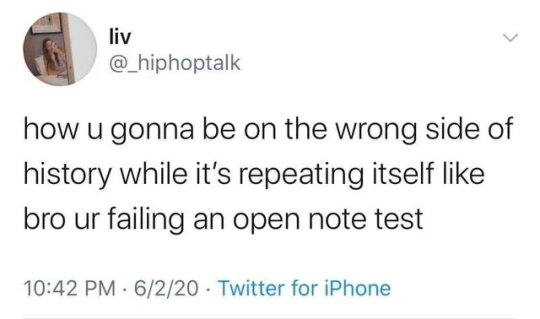
"how u gonna be on the wrong side of history while it's repeating itself like bro ur failing an open note test"
- @_hiphoptalk (account currently suspended)
#quotes#history doesn't repeat it rhymes#injustice#oppression#racism#sexism#homophobia#transphobia#fascism#anti fascist#politics#history
391 notes
·
View notes
Text
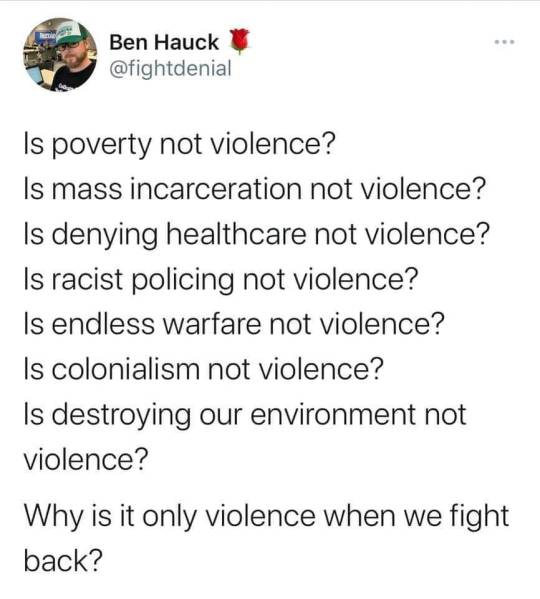
#politics#us politics#progressive#capitalism#imperialism#war#poverty#mass incarceration#universal healthcare#healthcare#racism#acab#colonialism#policing#injustice#environmentalism#green#activism#political violence#forever war#inequality#oppression
634 notes
·
View notes
Text
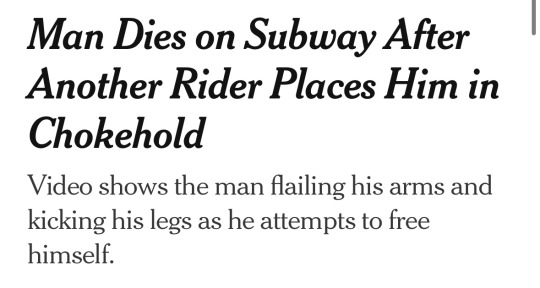
Source


Source
“[Mayor] Adams ordered the clearing of hundreds of homeless camps and sent an additional 1,000 police officers to patrol subways and remove homeless people from train cars and platforms. He also simultaneously cut $615M from the city’s Department of Homeless Services.”
#politics#us politics#black lives matter#racial injustice#racism#murder#government#the left#current events#news#activism#progressive#jordan Neely#New York
562 notes
·
View notes
Text
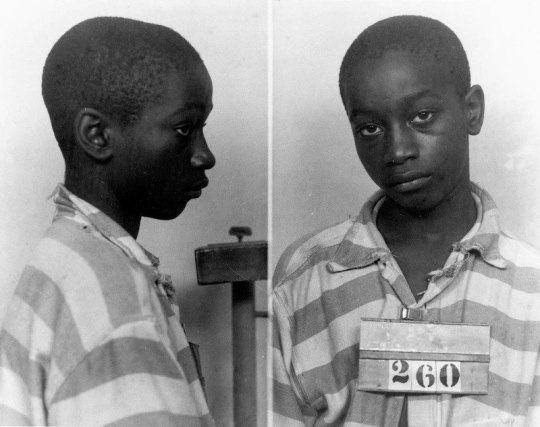
In March 1944, 14-year-old George Stinney was accused of the brutal murder of two white girls, 11-year-old Betty June Binnicker and 7-year-old Mary Emma Thames. The girls had been found dead in a ditch near their homes in Alcolu, South Carolina, and Stinney was quickly apprehended and charged. The accusations against him were heavily influenced by the racially charged atmosphere of the time.
Stinney’s trial, which was held on April 24, 1944, was infamously swift. He was tried in a court that lasted less than three hours, and the jury took just ten minutes to convict him. The proceedings were marred by a lack of proper legal representation, as Stinney’s defence was minimal and inadequate. The legal system failed him comprehensively, and the trial was conducted with a glaring disregard for due process and fair trial standards.
George Stinney was sentenced to death, and his execution by electrocution took place on June 16, 1944. At just 14 years old, Stinney was one of the youngest individuals ever executed in the U.S. His execution was carried out despite widespread calls for clemency and the absence of substantial evidence linking him to the crime. He was too short to properly fit in the electric chair, and a bible was used as a booster.
For decades, the case of George Stinney remained a tragic footnote in American history. It wasn't until 2014, more than 70 years after his execution, that his conviction was posthumously overturned. The South Carolina Circuit Judge Carmen Mullen declared that Stinney’s trial was fundamentally flawed, marked by procedural errors, racial bias, and a denial of fair legal representation.
34 notes
·
View notes
Text
i'm so serious, "you are not a cop, spencer. you never will be." "thank god for that, b." is one of the most important moments in the show for me. and the episode itself: i know it wasn't breaking new ground or anything, but the fact that the showrunners added much more combativeness to the duo's interactions with the police — that they were willing to depict two of their titlecard characters as cruel barriers to genuine pursuit of justice — during a case that so heavily involves gus and black culture... i honestly didn't expect it.
jules and lassie spend the whole episode keeping shawn and gus out of the loop, getting short-tempered, downplaying their concerns, and calling it all "department-wide prerogative out of their hands" as though that has stopped them in the past. the connection is clear even without needing to be brought up explicitly through dialog, is repeatedly depicted as something systemic, and isn't resolved with a pretty tied-up bow at the end (it seems very intentional that jules and lass never apologize), which just feels surprisingly mature for a silly 2000's sitcom about a fake psychic.
the writers didn't need to depict systemic racism in their show (whose main two protagonists aren't even cops) but they did so anyway, in a manner that your conservative father won't notice but will have you feeling that twinge of discomfort that a reflection of that reality should.
again, it's nothing groundbreaking, but i'm still glad it exists.
#like; yeah; if you want to take an episode of the detective show you've set in a police precinct#and make it depict purposefully black characters and their culture#part of that culture derives from injustice at the hands of the police#it would be inaccurate to ignore it#it's also very important to me that shawn is fully 100% supporting gus and his buddies the entire time; he's just as upset#i know jrr is hispanic and that the show plays around with the concept of shawn reflecting that#but for all intents and purposes Shawn Spencer is a White Guy#smth smth systemic racism is a race issue but your race shouldn't prevent you from standing in defiance of it#all in all; great episode. one of my favorites.#gus's college buddies make me laugh. dulé hill's singing makes me blush. the scenes with jules and lassie make me squirm.#burton guster's blackness my beloved#psych#burton guster#shawn spencer#running my mouth
21 notes
·
View notes
Text
@bravenewfilms
#the real donald trump#donald trump#racist trump#republican hypocrisy#black lives matter#blacklivesmatter#black people#racial injustice#racism#republican party#vote blue#black republicans#voter suppression#ppp loans#vote harris#vote democrat#please vote
24 notes
·
View notes
Text
Have a Heart Day 2024
This is a letter I wrote to the Canadian Government for Have a Heart Day 2024. I am asking the government to stop discriminating against First Nations children, to stop giving them inadequate services, education, and support, to stop treating them unequally compared to non-Indigenous children, and to stop taking them away from their loving families. I really hope that you read my letter and that you either copy paste it or write your own, and email the Canadian government yourself.
Hello. Our names are ____ and we are people from various parts of so-called Canada. We are writing to you to ask that you ensure the government stops discriminating against First Nations children, by signing a Final Settlement Agreement on Reform that meets and goes beyond the Agreement in Principle on Reform, and by following the Spirit Bear Plan and enshrining it into law.
First Nations children and families on reserves are being discriminated against in many ways. Most communities do not receive the same amount of and access to social services that non-Indigenous people receive. Most communities do not receive as good quality social services as non-Indigenous people. While there has been progress, Jordan's Principle, which is about meeting children's needs, is still not being properly applied. Most children don't have access to an equal quality of education as children off reserves, and many children receive very inadequate education services. And, very horrifyingly, children are being separated from families who love them and want to take care of them. This all needs to stop. We need to make, follow, and enforce laws that stop this discrimination.
First of all, let's talk about the fact that social services are inadequate on most reserves. As you know, the federal government funds services on reserves that the provincial or municipal governments fund elsewhere. The government generally funds services on reserves far less than services are funded off reserves. These include education, water infrastructure, housing, financial assistance, transportation, basic infrastructure, utilities, healthcare, mental healthcare, addiction support, job training, childcare, youth programs, cultural programs, recreation programs, libraries, child welfare, and more. These services are human rights and should be well-funded for everyone. It's not fair that non-Indigenous people have better services to better meet more of their fundamental human rights and basic needs while people on reserves don't.
The fact that people don't have access to the services they need is part of why there are high levels of poverty on reserves. Ongoing and historical racism, trauma, and discrimination have caused a lot of people on reserves to be poor. And this lack of services is part of that discrimination that is causing people to be poor. If people had the healthcare, education, housing, childcare, mental healthcare, addiction support, cultural support, job training, basic food and water, disability support, and other things they needed, they would be able to have the peace of mind, mental strength, knowledge, support, and resources necessary to pull themselves and their communities out of poverty. Also, since there is so much poverty on reserves, these communities need even more services to help meet their basic needs and human rights.
Services delivered need to be good and effective for the communities they are delivered in. This means that services need to meet each community's different needs. Because each community has different needs due to different connectivity to the outside world, poverty levels, local prices, etc. Service providers need to first see what services people need and how to best deliver them, then work out how much money is needed. Money should be the last thing considered. What each person, family, and community needs should be the first thing considered. And of course, services must all be culturally sensitive and relevant.
And part of why services are so low quality, as well as part of why so much discrimination and cruelty happens, is because Indigenous Services Canada has biases in its systems and people, and must be reformed. Indigenous Services Canada doesn't listen to experts about what communities need and how things should be done. They don't try to do their actual job, which is ensuring good services are provided to Indigenous people. They need to be reformed and communities need to lead their own service provision.
The Spirit Bear plan must be properly implemented and properly followed. It must be enshrined in law and the law must be completely enforced. The Spirit Bear Plan is the following:
"Spirit Bear calls on:
CANADA to immediately comply with all rulings by the Canadian Human Rights Tribunal ordering it to immediately cease its discriminatory funding of First Nations child and family services. The order further requires Canada to fully and properly implement Jordan's Principle (www.jordansprinciple.ca).
PARLIAMENT to ask the Parliamentary Budget Officer to publicly cost out the shortfalls in all federally funded public services provided to First Nations children, youth and families (education, health, water, child welfare, etc.) and propose solutions to fix it.
GOVERNMENT to consult with First Nations to co-create a holistic Spirit Bear Plan to end all of the inequalities (with dates and confirmed investments) in a short period of time sensitive to children's best interests, development and distinct community needs.
GOVERNMENT DEPARTMENTS providing services to First Nations children and families to undergo a thorough and independent 360° evaluation to identify any ongoing discriminatory ideologies, policies or practices and address them. These evaluation must be publicly available.
ALL PUBLIC SERVANTS including those at a senior level, to receive mandatory training to identify and address government ideology, policies and practices that fetter the implementation of the Truth and Reconciliation Commission's Calls to Action." This information is from the First Nations Child and Family Caring Society.
Another huge factor contributing to the inequality faced by many First Nations children is the fact that Jordan's Principle isn't being properly implemented.
The federal government, not the provincial government, typically pays for the services on reserves. But many times disputes arise about who should pay for a service, and the children don't get the services non-Indigenous children would get as a matter of course. Jordan's Principle is named after Jordan River Anderson, a young disabled boy from Norway House Cree Nation who passed away in the hospital after the provincial government and the federal government couldn't decide which one should pay the costs of his healthcare. The Principle states that if a First Nations child needs something for their well-being, they need to be given that service first and payment disputes should get addressed later. This includes medical, psychological, educational, cultural, disability, and basic needs support. Non-Indigenous children get these supports without having to ask because they have access to many more and better services. These supports are human rights that everyone deserves, especially children going through generational and contemporary trauma.
Jordan's Principle is not being properly implemented, and this is hurting kids. Though there has been much progress, Jordan's Principle requests, which are for things children need, are often denied, which goes against children's rights. Indigenous Services Canada, which runs the Jordan's Principle approval process, doesn't have an adequate complaints mechanism to hold to account its provision of the Principle. The government isn't making data available on whether they're meeting children's needs. Many children have delays in getting help, including time-sensitive medical, psychological, educational, and development help.
The application process, though easier than before, is still difficult and many families don't have adequate help and guidance through it. As well, most doctors don't know which children are eligible for Jordan's Principle supports, 40% don't know which services are covered, and ⅓ don't know how to access funding through it.
Long term reform is needed. An Agreement in Principle on long term reform has been drafted by the government and First Nations advocates, and it looks promising. It talks about increasing funding for Jordan's Principle services and trying to root out prejudice in the system. But the Agreement in Principle is not legally binding. It's not something the government has to follow, or is following, but rather what they claim they might do eventually. Negotiations for the creation of a Final Settlement Agreement based on the Agreement in Principle were underway but have been on standstill for months. A Final Settlement Agreement would be legally binding and would if done right increase the chances of achieving change.
The school system is also horribly unfair. Many First Nations schools on reserves get less funding than schools off reserve, with an average of 30% less funding per school. They don't have adequate funding for computers, software, technology, sports equipment, field trips, labs, lab equipment, extracurriculars, cultural learning, job training, and the list goes on. They don't even have enough money to have adequate heating, good quality infrastructure, adequate and safe ventilation, enough textbooks, and reasonable class sizes. Many schools don't have a safe and appropriate learning environment. All children, including First Nations children, deserve good education.
There is no clear plan to eliminate education and employment gaps.
The government claims it's negotiating with Indigenous groups but there's no evidence that they're actually doing anything to lower inequality. They also claim that they're funding education on reserves equally but all the evidence says they're not. You need to actually, genuinely fund education on reserves adequately and equitably, and make sure that children on reserves are actually receiving a good and equal and equitable quality of education.
A lot of communities don't have self-determination over their own education systems, meaning they can't teach about the history of their people and other important cultural knowledge. First Nations children need and deserve to learn about their culture, about the ecosystems their people are connected to and how to interact with those ecosystems, their history, their language, their traditions. And if communities have self-determination over their own education systems, and they have adequate resources and funding from the government, they'll be able to teach these things so that children grow up proud of who they are.
And what is perhaps the most horrible thing is that so many children are being separated from families who love them. This is the most traumatic thing that can happen to a child, and all children deserve and need to be with the families who love them.
At the height of residential schools, many children were separated from their families. Currently, 3 times as many children are in foster care, away from their families. One tenth of First Nations children have been in foster care. Children in foster care experience higher rates of physical and sexual abuse and do not get as much cultural immersion. Not to mention, even in the best circumstances, they're away from their families.
Most Indigenous children in foster care have loving families that try their best to take care of them, who they want and need deeply. But their families are poor or mentally ill or disabled, or have other factors that make it hard for them to meet their children's needs. Preventative support like financial, housing, health, and mental health aid could keep many families together. If child and family service agencies have the resources and the empathy to help families with what they need so that families stay together, that would be a great relief. Child and family service agencies need adequate money, infrastructure, and personnel to give families real help instead of taking children away. Most agencies do not have these. Programs that help the wider community such as healthcare, financial aid, housing services, mental healthcare, parenting classes, food support, community programs, youth programs, cultural programs, pregnancy support, and others would greatly decrease the number of children taken from their homes. Most communities do not have adequate levels of these programs.
Child and family service agencies need to be completely reformed, and should be led by First Nations communities themselves. Most child and family service agencies are not. This is especially important since there is bias against First Nations people in many agencies. Some communities are getting the opportunities to start their own child and family service agencies, but most communities do not have this opportunity. Canada needs binding laws to ensure child and family service agencies are led by First Nations communities and are based in the unique culture of each community, which they often aren't. Each community has unique needs depending on local prices, remoteness, poverty levels, and other factors. The way child and family services should be funded is by first seeing what services the children truly need, then seeing how to best deliver them, then determining how much money will be needed.
There is a promising Agreement in Principle on Reform, created by the government and First Nations advocates. It discusses increasing funding for child welfare services and trying to root out prejudice in the system. However this is not a legally binding agreement that the government has to follow. It's just something that they claim they'll maybe do in the future. A Final Settlement Agreement based on the Agreement in Principle would be legally binding. It would, if done right, enact more funding and reform. But negotiations for this have been on pause for months. Canada needs to implement evidence-based solutions to keep kids with their families. This means creating a legally binding and well-enforced Final Settlement Agreement on Reform that meets and goes beyond the Agreement in Principle on Reform.
Some communities are trying a new funding model for child and family services that may give more funding, allowing them to do more preventative services instead of taking children away. However, the results of this new funding model are not clear yet, and most communities do not have the opportunity to be funded by it. And there is no guarantee that the new funding model will be applied to all communities if it indeed does work. There is no guarantee that enough funding for prevention services will be given to all communities, whether or not the new funding model works.
The government often promises to create reform or adequately fund things, but they don't follow through on those promises. If the government does make progress, safeguards need to be in place to stop them from backsliding.
So here are our asks for you:
-Implement the Spirit Bear plan and adequately fund all social services on reserves.
-Make sure all services are available de facto just like they are off reserve.
-Fund cultural services and make sure all services are culturally-rooted.
-Eliminate all discrimination and bias in service providers.
-Listen to experts such as doctors and teachers, the community, and community-led service providers.
-Allow and help First Nations communities to lead their own social services rooted in their own cultural values.
-Keep funding flexible and adaptable to changing needs.
-Have adequate accountability measures for all service providers.
-Make a binding law to adequately fund all social services and have communities lead social service provision.
-Create a binding law to ensure that once you start adequately funding social services you don't stop.
-In a reasonable timeframe, reach a Final Settlement Agreement on Long-Term Reform that meets and goes beyond the Agreement in Principle.
-Make sure all Jordan's Principle requests in the best interests of children are accepted.
-Give presumptive approval for Jordan's Principle requests under $250.
-Support organizations and communities already providing Jordan's Principle services.
-Accept urgent requests within 12 hours and non urgent requests within 48 hours.
-Don't require more than one document from a professional or elder for making requests.
-Make data available on Jordan's Principle provision effectiveness.
-Make sure all supports are given in a timely manner without delays.
-Make it easy and convenient for families and professionals to make Jordan's Principle requests.
-Fund schools on reserves as much as schools off reserve. This includes funding for computers, libraries, software, teacher training, special education, education research, language programs, cultural programs, mental health support, support for kids with special needs, extracurriculars, ventilation, heating, mold removal, vocation training for students, and more.
-Make sure all schools have the resources, funding, and support necessary to teach culture.
-Make a clear joint strategy to eliminate the education and employment gap.
-Make sure all school staff are non-discriminatory.
-Make sure communities have self-determination to create culturally rooted education.
-Adequately fund child and family services on reserves, and make sure they can hire enough people and have good infrastructure.
-Stop discrimination within child and family service agencies.
-Allow and help all First Nations communities to lead and run their own child and family service agencies that are based on their cultural values.
-Enact evidence based solutions to keep families together.
-Don't take children from families that love them.
-Have and fund adequate preventative services so families can take care of their children and no child is taken away.
-Keep funding for child and family services flexible and responsive to each community's needs, and listen to communities to learn what their needs are.
-Have adequate accountability in child and family services so that any underfunding, discrimination, or failure is stopped and remedied.
-Family support needs to start at or even before pregnancy.
-Fund culturally-based healing of people who have been harmed and are being harmed by the government's discrimination.
———
Find your MP here: https://www.ourcommons.ca/en/members
justin.trudeau(at)parl.gc.ca- Prime Minister Trudeau
chrystia.freeland(at)parl.gc.ca- Deputy Prime Minister Freeland
patty.hajdu(at)parl.gc.ca- Minister of Indigenous Services
gary.anand(at)parl.gc.ca - Minister of Crown-Indigenous Relations
#canadian#canada#canadian politics#cdnpoli#indigenous lives matter#indigenous rights#indigenous sovereignty#every child matters#bipoc lives matter#discrimination#racism#oppression#social juatice#child rights#children’s rights#social issues#inequality#injustice#family#community#childhood#childhood trauma#trauma#family separation#separation#hurt#pain#saddness#letter#action
57 notes
·
View notes
Text
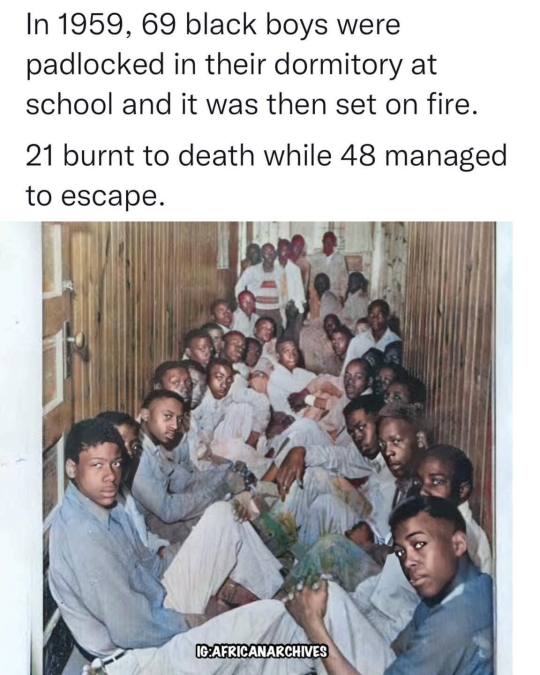
On March 5th, 1959, 69 African American boys, ages 13 to 17, were padlocked in their dormitory for the night at the Negro Boys Industrial School in Wrightsville. Around 4 a.m., a fire mysteriously ignited, forcing the boys to fight and claw their way out of the burning building. The old, run-down, & low-funded facility, just 15 minutes south of Little Rock, housed 69 teens from ages 13-17. Most were either homeless or incarcerated for petty crimes such as doing pranks. 48 boys managed to escape the fire. The doors were locked from the outside and fire mysteriously ignited on a cold, wet morning, following earlier thunderstorms in the same area of rural Pulaski County. The horrific event brought attention to the deplorable conditions in which the boys lived. The boys all slept in a space barely big enough for them to move around & theyre one foot apart from one another & their bathroom was a bucket at the corner where they had to defecate in. In an ironic twist, the land in which the school stood is now the Arkansas Department of Correction Facility Wrightsville Unit. In 2019 a plaque was finally placed after 60 years.
PURE EVIL!!! MY GOD!!
#white racial hatred#white people are evil#racism#civil rights#history#black history#historical injustice#institutional neglect#fire tragedy#juvenile justice#systemic racism#correctional facilities#commemoration#memorialization#social reform
1K notes
·
View notes
Text
#project 2025#agenda 47#trumps project 2025#civil rights#mlk#politics#donald trump#2024 presidential election#blacklivesmatter#black lives matter#black liberation#vote blue#vote kamala#kamala 2024#kamala harris#kamala for president#democrats#republicans#black people#african american#racism#racial issues#right wing extremism#trump 2024#black women#racial injustice#fuck trump
98 notes
·
View notes
Text
there's this kind of youtuber i lowkey really hate who aren't overt bigots or anything but just do this thing where they seem to try stupidly hard to look for reasons to hate media that just so happens to have a lot of marginalised rep in it. especially if it has a thematic point that would involve acknowledging politics
#my favourite example of that (as in i actually find it funny not it annoys me)#is cinemasins complaining the train in snowpiercer and the guy who wants the protagonist's eyes in get out don't make sense#like. they don't have to be explained in the story the point is they're a commentary on socio economic injustices and racism#stories aren't logic puzzles they're parables and if you read them as being logic puzzles you're doing it wrong#and spoiling a lot of really profound media for yourself#having said that the youtubers i hate most are reactionary cunts like nerdrotic critical drinker or turkey tom#they should be punched every time they upload until they fuck off#and the most annoying kind of youtubers (not hatable but annoying) are the ones who try to argue that mainstream media#which is trying to be diverse and progressive is Bad Actually (verilybitchie is awful for that and she doesn't like pan people#so that put me off her pretty quickly which is a shame bc some of her videos and topics are interesting)
34 notes
·
View notes
Text
A white cop (now ex-cop) who pleads guilty to raping a 13 year old girl gets a sentence of 20 days. The same week, a Black woman who pleads guilty to killing the man who sex trafficked her gets a sentence of 11 years.
12 notes
·
View notes